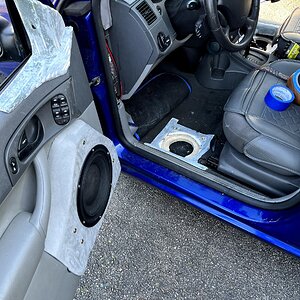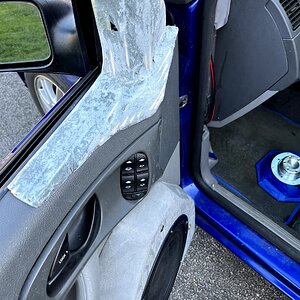Time for a beefier alt, or do I need another battery?
- Thread starter bananapehl777
- Start date
- Replies 24
- Views 3K
You are using an out of date browser. It may not display this or other websites correctly.
You should upgrade or use an alternative browser.
You should upgrade or use an alternative browser.
-
10Participant count
-
Participant list
ThxOne Premium Member
The Boss
I am sorry that this is what you are basing your argument on. However, it is not 100% factual. I will agree with you that the alternator is a necessary part of the automotive charging system.You should read and understand this: http://www.bcae1.com/charging.htm
Doesn't get much more basic than that.
How many amps of current does your stock cars electronics demand to work properly from the factory?
Engine Computer, Injectors, Body Control Module, A/C System, Factory Stereo, Head Lights, Wipers, All Sensors on the Engine, All Sensors on the Body, TPMS, Fuel Pump, Oxygen Sensors...
Lets say your stock alternator is 135amps
Lets say your stock max electrical load pulls 200amps
The car still runs even though the max amp output of the alternator has been exceeded
The battery is capable of supplying the current needed to fill that deficit because that is what it is designed for... not just starting the car.
Hell, let's match the alternator, let's say the car will pull a max of 135amps. Better hope there isn't a hidden load somewhere right.
But we know it is fine even then because there are several hundred more amps of available current sitting there waiting to be used.
Now you add your aftermarket stereo with its (just for an example) 100amp load. Now you are WAY over the max output of that alternator... but the stereo still plays. Thank the lord for the stored energy in that battery.
The energy in that battery will still diminish even with the alternator charging it so to compensate, the output of the alternator is boosted higher via voltage a few volts above the resting voltage of the battery. So now you are charging your battery with a 2v 135a power supply. - In this example.
Lastly, automotive batteries weren't designed for car audio use. They are designed to run a 12v electrical system. The majority of car audio amplifiers require 14+v for their "rated" power. This is one reason that 14v and 16v batteries were invented for the car audio industry.
It is always a good idea to upgrade to a higher output alternator to help recover/charge the system quicker.
bananapehl777
CarAudio.com Newbie
- Thread Starter
- #18
UPDATE: Added an XS Power 3400D AGM to my brand new Interstate MTP 35. Seems to have mostly resolved the headlight dimming issue. At an idle tho, the RPMS will drop when the bass hits full tilt, but I am assuming this is normal, similar to when cooling fans turn on ect. But after they drop, it goes back right to the original idle speed very quickly even if the subs are still playing. They don't drop enough to shake the car or stall it either. Here's a picture of the install. Never heard my system sound as loud as it does now. Thanks everyone for the advice!
Attachments
n2audio 5,000+ posts
OPTIDRIVEN
I am sorry that this is what you are basing your argument on. However, it is not 100% factual.
It's not what I'm basing my argument on, but it is certainly 100% accurate. It provides the fundamentals, or basics as I originally stated.
I didn't really disagree with your dissertation other than your original statement that the alt isn't powering the system. It is absolutely the primary source, this is known because it operates at the highest voltage. The battery is ONLY the source for momentary high current demand and at times when the alts peak output is exceeded. If those two things create a situation that makes the battery the source with much regularity, that alt won't last long.
Lasherž
CarAudio.com Elite
I am sorry that this is what you are basing your argument on. However, it is not 100% factual. I will agree with you that the alternator is a necessary part of the automotive charging system.
How many amps of current does your stock cars electronics demand to work properly from the factory?
Engine Computer, Injectors, Body Control Module, A/C System, Factory Stereo, Head Lights, Wipers, All Sensors on the Engine, All Sensors on the Body, TPMS, Fuel Pump, Oxygen Sensors...
Lets say your stock alternator is 135amps
Lets say your stock max electrical load pulls 200amps
The car still runs even though the max amp output of the alternator has been exceeded
The battery is capable of supplying the current needed to fill that deficit because that is what it is designed for... not just starting the car.
Hell, let's match the alternator, let's say the car will pull a max of 135amps. Better hope there isn't a hidden load somewhere right.
But we know it is fine even then because there are several hundred more amps of available current sitting there waiting to be used.
Now you add your aftermarket stereo with its (just for an example) 100amp load. Now you are WAY over the max output of that alternator... but the stereo still plays. Thank the lord for the stored energy in that battery.
The energy in that battery will still diminish even with the alternator charging it so to compensate, the output of the alternator is boosted higher via voltage a few volts above the resting voltage of the battery. So now you are charging your battery with a 2v 135a power supply. - In this example.
Lastly, automotive batteries weren't designed for car audio use. They are designed to run a 12v electrical system. The majority of car audio amplifiers require 14+v for their "rated" power. This is one reason that 14v and 16v batteries were invented for the car audio industry.
It is always a good idea to upgrade to a higher output alternator to help recover/charge the system quicker.
I don't think anything on http://www.bcae1.com/charging.htm disagrees with what you said about exceeding the rating. It says, "As long as the engine is running, all of the power for the accessories is delivered by the alternator. The battery is actually a load on the charging system. The only time that the battery would supply power with the engine running is when the current capacity of the alternator is exceeded or when engine is at a very low idle."
I think you have a decent understanding of that, but this example of yours in particular is problematic.
The energy in that battery will still diminish even with the alternator charging it so to compensate, the output of the alternator is boosted higher via voltage a few volts above the resting voltage of the battery. So now you are charging your battery with a 2v 135a power supply. - In this example."
The alternator is always at the same voltage, usually 13.8 to 14.2v some as high as 14.5v as determined by its voltage regulators. The difference in an alternator under load vs not is the amount of current it's putting out and it's regulated through the resistance of the system (particularly the battery's internal resistance which is why you shouldn't disconnect your battery while the car's running). When the voltage drops, not only is your alternator put at full torque due to low resistance loads from accessories, it's also going to continue a heavier load until the battery is recharged and the internal resistance is once again elevated.
It seems like some of that was probably based on misunderstandings so I don't want to come down hard on you, but the example in particular wasn't in line with reality as far as how alternators work.
ThxOne Premium Member
The Boss
The power will ALWAYS be taken from the source with least resistance. - Fact.
The vehicles computer in a modern car is monitoring the BATTERY voltage. When it drops below a certain voltage, it tells the voltage regulator to send more power to the BATTERY. - Fact.
If the alternator is the source of ALL power after the car is started then the battery would be isolated after ignition start. There would be no need to charge it and the alternator would last longer. - This does not happen.
If the alternator is the source of all power then the need for batteries in the back all lined up with power cables on them connecting them together aren't doing anything for that huge competition stereo. There should be a group of alternators under the hood with power cables run directly to the amplifiers instead. - This also does not happen.
Batteries are just for starting things. - False
In fact, I am going to remove the battery from my motherboard and install a tiny alternator to power my BIOS.
I will fashion a tiny alternator bracket for my flashlights, my drills, my cell phone, my TV remotes... I don't know why I didn't think of this before. I hope Dayco has the belts I will be needing. - Sarcasm.
The vehicles computer in a modern car is monitoring the BATTERY voltage. When it drops below a certain voltage, it tells the voltage regulator to send more power to the BATTERY. - Fact.
If the alternator is the source of ALL power after the car is started then the battery would be isolated after ignition start. There would be no need to charge it and the alternator would last longer. - This does not happen.
If the alternator is the source of all power then the need for batteries in the back all lined up with power cables on them connecting them together aren't doing anything for that huge competition stereo. There should be a group of alternators under the hood with power cables run directly to the amplifiers instead. - This also does not happen.
Batteries are just for starting things. - False
In fact, I am going to remove the battery from my motherboard and install a tiny alternator to power my BIOS.
I will fashion a tiny alternator bracket for my flashlights, my drills, my cell phone, my TV remotes... I don't know why I didn't think of this before. I hope Dayco has the belts I will be needing. - Sarcasm.
Lasherž
CarAudio.com Elite
I don't know who argued that it wouldn't, but even that is a bit misleading. The voltage determines the source(s) utilized. If they're not matched the higher voltage source will be the primary until the voltage drop of the system is sufficient to utilize the other source, at which point they'll both be the source. Until that happens the battery is a load, not a source.The power will ALWAYS be taken from the source with least resistance. - Fact.
You're correct, some old alternators had their own voltage regulators but since some ECUs do complicated things with the charging system for efficiency/EPA standards they've taken over the duty of regulating the current from the alternator. The battery is being monitored primarily for the current to and from the battery, but some modern cars also measure temperature, voltage, as well as current. They use this to check the health of the battery and to shed loads or make decisions about whether to disable start-stop and other features reliant on the battery or when to charge it for maximum efficiency. Cold batteries charge faster and so the ECU often prioritizes early charging, but will let the voltage sag a little when the engine compartment is hot.The vehicles computer in a modern car is monitoring the BATTERY voltage. When it drops below a certain voltage, it tells the voltage regulator to send more power to the BATTERY. - Fact.
I don't think anyone argued that it was the only source of power in any situation so long as the engine on, the battery isn't a source though until the current rating of the alternator is exceeded which is quite rare in most cars. That doesn't mean it's not important during that time though since it stabilizes the voltage of the car.If the alternator is the source of ALL power after the car is started then the battery would be isolated after ignition start. There would be no need to charge it and the alternator would last longer. - This does not happen.
Again, batteries both stabilize and provide power when the alternator ratings are exceeded. With audio systems that's common, but with regular cars it's not.If the alternator is the source of all power then the need for batteries in the back all lined up with power cables on them connecting them together aren't doing anything for that huge competition stereo. There should be a group of alternators under the hood with power cables run directly to the amplifiers instead. - This also does not happen.
Who argued they were?Batteries are just for starting things. - False
The motherboard already bypasses the battery for powering the CMOS for date/time and when the computer's got ATX power, just never unplug it and pray to the power company gods to keep the juice flowing.In fact, I am going to remove the battery from my motherboard and install a tiny alternator to power my BIOS.
What you're describing is a generator with a battery charger plugged into it.I will fashion a tiny alternator bracket for my flashlights, my drills, my cell phone, my TV remotes... I don't know why I didn't think of this before. I hope Dayco has the belts I will be needing. - Sarcasm.
ThxOne Premium Member
The Boss
I don't know who argued that it wouldn't, but even that is a bit misleading. The voltage determines the source(s) utilized. If they're not matched the higher voltage source will be the primary until the voltage drop of the system is sufficient to utilize the other source, at which point they'll both be the source. Until that happens the battery is a load, not a source.
You're correct, some old alternators had their own voltage regulators but since some ECUs do complicated things with the charging system for efficiency/EPA standards they've taken over the duty of regulating the current from the alternator. The battery is being monitored primarily for the current to and from the battery, but some modern cars also measure temperature, voltage, as well as current. They use this to check the health of the battery and to shed loads or make decisions about whether to disable start-stop and other features reliant on the battery or when to charge it for maximum efficiency. Cold batteries charge faster and so the ECU often prioritizes early charging, but will let the voltage sag a little when the engine compartment is hot.
I don't think anyone argued that it was the only source of power in any situation so long as the engine on, the battery isn't a source though until the current rating of the alternator is exceeded which is quite rare in most cars. That doesn't mean it's not important during that time though since it stabilizes the voltage of the car.
Again, batteries both stabilize and provide power when the alternator ratings are exceeded. With audio systems that's common, but with regular cars it's not.
Who argued they were?
The motherboard already bypasses the battery for powering the CMOS for date/time and when the computer's got ATX power, just never unplug it and pray to the power company gods to keep the juice flowing.
What you're describing is a generator with a battery charger plugged into it.

ThxOne Premium Member
The Boss
Lasherž
CarAudio.com Elite
Although it's technically true, it's always bothered me a little bit that it's said a battery "produces" power, whereas a capacitor doesn't. It leads to silly arguments over the purpose of a battery where each word you choose can be meant in the right way but technically wrong still. You obviously understand how they work by your example of the accessories exceeding the alternator's current capability and the battery filling in to power beyond that. It's probably best to just stick to that example.So what does an alternator do for a Tesla?
Damn Teslas with their regenerative brakes.
Activity
No one is currently typing a reply...
Similar threads
Any alternator will outlive a boxer engine. I like my iraggi alternator.
- Started by ikpthegame
- Wiring, Electrical & Installation
- 2
- 586
$500 is not unreasonable, but just know about alternator shopping:
There are two numbers that matter:
The amp output at or near idle (what's it...
- Started by Oldbasshead
- Wiring, Electrical & Installation
- 7
- 754
okay thank you i requested a quote.
- Started by masonstephens55
- Enclosure Design & Construction
- 5
- 2K
What vehicle was the HO on?
- Started by oxsign
- Wiring, Electrical & Installation
- 1
- 1K
What is the C rating of those cells?
- Started by Bass so loud it HZ
- Wiring, Electrical & Installation
- 2
- 928




